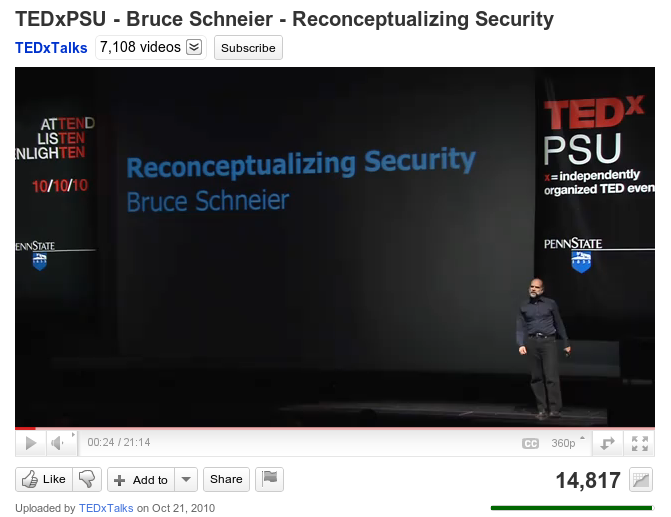
Security expert Bruce Schneier speaks at Penn State University on October 10, 2010. (credit: youtube.com),
Months ago, Matthew Hochstein, a project director with the Evanston-based emergency management consulting firm Hagerty Consulting, explained how the government prioritizes resources when it comes to preparing for, and then dealing with emergency events.
“Prioritizing resources is a tough job,” he said. “It’s very complicated because you’re dealing with not just multiple states, but multiple regions. For example, the water/ice/MREs in the first 72 hours is probably the first and most important thing next to search and rescue teams. Search and rescue teams and live-saving commodities are the most important resources you’re going to need in the first 72 hours. These are not infinite resources.”
There’s also an important federal versus local dynamic, “Largely the role of FEMA at the Federal level is trying to provide a 50,000-foot view of, ‘Here’s the true situation for each of the areas that are hardest hit. We need to prioritize all resources and equipment there first, get search and rescue teams there first. And then work you’re way out to areas that were not as heavily impacted.”
Politics factor in, according to Hochstein, “It does play into where some resources go. That’s the fact.”
Throughout the term I’ve looked closely at the scientific risk and the financial risk associated with emergency management and homeland security. I was curious to know more about the role that political risk plays.
Paul Rosenzweig, former deputy assistant secretary for policy in the U.S. Department of Homeland Security, is a Carnegie National Security Fellow at Medill School of Journalism. “Political risk is part and parcel of all the risks that important actors consider,” he told me.
“It’s hard to explain risk to people. It’s hard to explain the science of hurricanes, or the science of highway traffic accidents,” he said. “There’s a sense in which risk, and all its cost-benefit analysis has a dissonance with some fundamental moral and social principles that people get from somewhere outside of risk analysis.”
Bruce Schneier is among the most insightful voices on security subjects, and Chief Security Technology Officer of European telecom company BT. Last October he gave a TED talk, Reconceptualizing Security, to an audience at Penn State University, that amplifies Rosenzweig’s point.
“Security is two different things. It’s a feeling. And it’s a reality,” he said. “You can feel secure even if you’re not. And you can be secure even if you don’t feel it. We have two separate concepts mapped on to the same word.”
The rest of the talk is Schneier unpacking the two dimensions of security. First, he summarizes the economics of security decision-making in terms of ever present risk/reward tradeoffs, “The question you need to ask about security anything isn’t ‘does this make us safer?. It’s ‘is this worth the tradeoff?'”
“There’s no right or wrong here. Some of us have a burglar alarm. Some of us don’t,” he said. “A lot of times these tradeoffs are about more than just security. People have a natural intuition about these tradeoffs. We make them everyday.”
Given the everyday-ness of the security tradeoffs people make, you would expect people to be good at making those decisions, yet they are not. “We are hopelessly bad at it,” Schneier observes. His short answer for why, “We respond to the feeling of security and not the reality.”
Feelings, it turns out, can be inadequate models of reality. Terrorism events, for example, are exceedingly rare but are a outsize presence in our current lives, according to Schneier.
Here, Rosenzweig disagrees, “People’s moral judgments are just as evidence-based” as the reality Schneier holds up. “I don’t necessarily accept the premise that because their feelings, they can’t point to a scientific grounding for them that they’re less worthy of consideration in any sort of risk analysis.”
Political risk is, it seems, the ultimate tradeoff. Tension between political safety, public safety, reality and feelings make emergency management and security decision-making difficult. Yet functional government and functional society are possible when these decisions are made, and not deferred.
The lessons for citizens when it comes to both emergencies and government emergency management are, I suppose, the same: Be aware and be prepared.





